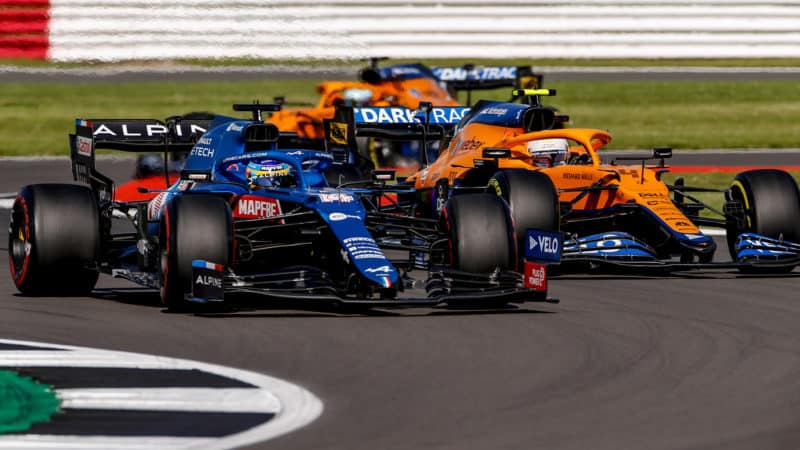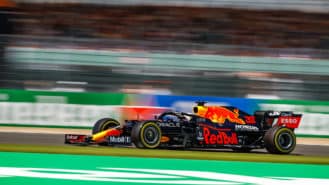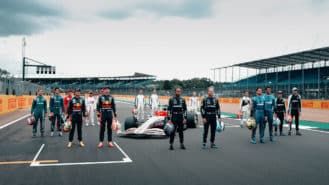Perhaps the main take we got from the sprint itself was that it was good to see drivers able to generally run flat out, with no fuel saving or pit strategy and so on. That’s exactly what Ross Brawn promised us.
There might not have been any passing at the front after Verstappen got the jump on Hamilton at the start, but a charging Fernando Alonso showed that there is scope for added value, while further down the order Carlos Sainz put in a good recovery drive after his first lap clash with George Russell.
In addition, Sergio Perez’s spin, which left the Red Bull driver classified last, showed that the sprint can cause upsets.
As F1 managing director, Brawn was one of the key supporters of the sprint format. It’s the biggest change to be introduced thus far on his watch, so he was keen to see how it played out.
“That first lap or so was completely nail-biting, sensational.”
“I think one of the things we all saw today is a racing driver is a racing driver,” he said. “And they’re never going to take it easy. So lots of action through the field. I mean, that first lap or so was completely nail-biting, sensational. Then we had the little duels in the rest of the race.
“Fernando Alonso’s performance today was another sensational part of the race. He got my vote for the highlight of the race. I’d buy a ticket for that every day. So I think we’re very pleased. We’ll let the dust settle on this weekend, and then spend some time with the FIA and the teams trying to understand if there’s some evolutions we want.
“We won’t be changing the fundamental format this year. And I think after the three races, we can sit down and decide where we go from here. But so far, very positive.”
Mercedes boss Toto Wolff agreed that the experiment was a success, despite the obvious frustration for his team that fastest qualifier Hamilton will start the British GP from second place.
“I think it’s entertaining for the crowds on the track,” said the Austrian. “A start is always interesting and good content. And obviously, Alonso was fun to watch. So I think overall, it is a good add-on.
“I don’t see it at every race. I think there’s too much randomness, if you see Checo spinning out and then retiring, last is not the place that Sergio Perez should be, and therefore for him, obviously, it could really work against you if you’re one of the frontrunners.
“So there’s too much randomness, but I think if the next few ones go like this one, I think it has a place in the calendar in a limited form.”
Wolff agreed that the key was not introducing any artificial element: “I am totally against reverse grids. It’s just fake. But here, everybody started from the right positions. I believe that qualifying was yesterday. And also qualifying should be called qualifying, and not the sprint race. But this is really a detail. I believe that it was a bit dull towards the end. But until then, I would say it has merit.
“I think if it is a kind of Grand Slam for a couple or a few races, I think that is good, because you provide some real entertainment on the Saturday. We are prime time TV Friday night, we are primetime TV Saturday night, and obviously the Grand Prix.”
Alonso’s spirited performance was the highlight of the sprint as the former champ cheekily jumped from P11 to P5 on the first lap, and then did his best to hold off the much faster McLarens.
“I think it was quite a lot of action,” he explained. “Even more than I expected or anticipated because you can lose more than what you can gain. We see with Checo, you can start last tomorrow. And if everything goes well, you can recover one or two places. So there is a lot more to lose than to gain. So I think with that in mind, I think there was a lot of action, honestly, in the race.”
Alonso has been around for a while and has thus experienced various qualifying systems over the years. He thinks that the sprint works well.
“Yeah, I like the format,” said the Alpine driver. “I think we have action three days, Friday, Saturday and Sunday. So it’s good for the people. Last year when I was watching races at home on Friday meant nothing, because the long runs, they are very important for the teams, the drivers, but not for the people at home, that they were very long free practice, to understand from the outside. I hope we can keep this format.
“And if anything, I will suggest Fridays could be more spicy as well. You know, like having one set of tyres and one attempt for everybody, it gives the same chances for all of us. It’s not an unfair qualifying or reverse order or anything like that, that I understand can be unfair.
“But if we give one set of tyres and one chance for all of us, it’s the same for everybody. And maybe it changes something, because we saw yesterday with six attempts and six set of tyres we finished in the order that we deserve, and we finish in the performance order of our cars like every qualifying.
“And maybe that can be a little bit changed and have even better Saturday sprint qualifyings if one of the fast cars is not in the first two rows of the grid. That is what happened yesterday [with Perez fifth].”



